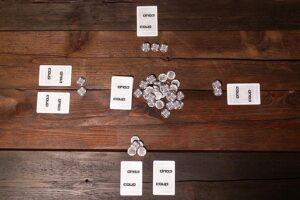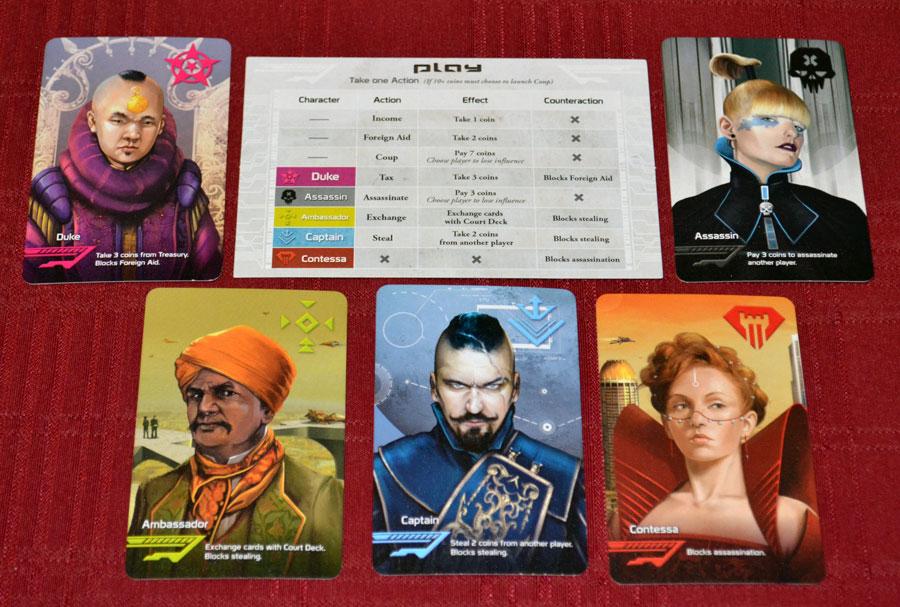Name of Game:
Coup
Creator:
Rikki Tahta
Platform:
Card Game
Target Audience:
This game is for people who really like games that involve strategy and deception, and people who can try to think three steps ahead, so agewise probably age 14+. Ideally it would be played with 4-6 players even though it could technically be played with 2 or 3 as well. And it’s great for friends, families, and strangers…really anyone who appreciates strategy and isn’t afraid to lie!
Argument:
Coup successfully creates a game of challenge for strategists by creating a game that is dependent on lying and deception, but with limitations through the number of cards each player is allowed. However, the looming threat of a player reaching a position of uncontested power of eliminating anyone from the game by reaching 7+ tokens, also unites all the players as they try to prevent a sole individual from reaching such a status.
Analysis:
The game maker was very clever in the way they designed the game. For starters, the fact that every player only has two cards is great, because one, it limits your ability to lie, since you can claim at most two characters at a time. With there being 5 different characters, with character do you say you are to benefit you in whatever position you find yourself in. Additionally what makes the game so intriguing is the fact you only get two “lives” in the game. If you try to “challenge” someone (i.e. claim they are lying) and you are wrong, you lose one of your lives, however if you get caught in a lie, you lose one life yourself. Since you only have two lives, the stakes feel very high, so you want to ensure you have a strategy going on and you can adapt to different situations you find yourself in, and only challenge someone if you are confident they are lying…or if you have nothing to lose. I also really think it’s clever that there is the looming threat of a player reaching seven tokens, which gives them the ability to force a player to lose a card and there is nothing any player can do to contest that elimination. This means that all players also have the shared objective of ensuring no one that’s not them reaches that level of power.
One flaw of the design is within the rules, where it’s not clear what to do with cards if one player needs to give up a card, or if they are the ‘Ambassador’ character and get to exchange their cards. When I was playing during Game Night, we played two different ways, one in which cards always went back in the pile and were shuffled, and the second round, if you lose a card, it was placed on table face up, and when you go to exchange your cards you take the top two cards and place whatever two cards you did not choose to keep back on the top of the deck. Playing the first way where cards always went back into the deck and shuffled, the only strategy was to lie, because no one knew what cards could have been pulled, couldn’t keep track of what cards should have been out of rotation, and since every deck had three of each card, there was plenty chance that for every pick of a new card, could have gotten any card. However, when we played the second round, and cards were pulled out of rotation, we were able to be a lot more strategic. Because when someone played the ambassador card and always had to take the top two cards and then place the leftover cards back at top, it allowed the person who just pulled to know what the next person who chooses to pull options are, and they can use that information to deduce better if they lie in the future.
Another flaw in design is the fact that there are three of each card. I think the game would be more interesting if there were more of one kind of card, and perhaps less of another kind because you can use probability and statistics to see if someone is lying. Or for instance if there are only two kinds of one card and you happen to have both, if someone claims to have one of those cards you automatically know they are lying. So essentially by getting an “unlucky” draw of having two of the same kind of card, it gives you some power because you have the opportunity to catch a liar.
A similar game would be Mafia/werewolf but where Coup differs is that you can have multiple roles as opposed to one, but you also have the opportunity to switch roles throughout the games, which is a key element of Coup, and the key reason strategy is key.




